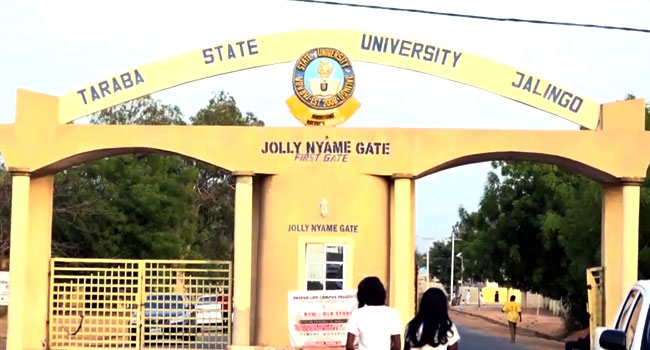Gullies are one of the greatest environmental challenge facing many towns and villages in the country. New gully sites are formed during every rainy season owing to torrential rainfall and the nature of topography.
The massive soil loss caused by gully formation often result in severe ecological damages, soil fertility depletion, considerable loss of soil structure, loss of lives, reduction of soil biodiversity, and reduction in agricultural productivity, among others.
The desire to save his people from untold hardship caused by a 747-metre long gully may have led the Etsu of Pategi, Alhaji Ibrahim Umar Bologi, to begin a quest to recover the Pategi Council and its environs in Kwara North Senatorial District.
The gully is not only a horrible sight, but a death trap that has created food insecurity and disruption of socioeconomic activities in the community.
According to information gleaned from residents of the Nupe community of Pategi, Kwara State, the gully, which is on Rifun Road, by General Hospital, led to food shortage in the area, as farmers had begun abandoning their farms for lack of access amid the ravaging poor socio-economic situation in the land. Aside from farmers abandoning their farms, shop owners in the area started moving enmass to other locations.
The menace created by the erosion was initially unattended until it became life-threatening.
The Etsu’s search for a lasting solution eventually took him to the National-Hydroelectric Power Producing Areas Development Commission (N-HYPPADEC) in Abuja.
The N-HYPPADEC was said to have been directed by the office of the Secretary to the Government of the Federation (SGF) to take charge of the situation so as to fulfill government’s responsibility to its people.
The team of engineers, which arrived the place, realised the Federal Government would have to reclaim over 75-metre land (on both sides) devastated by erosion to save the community.
The lead engineer, Kemi Idiat Olaiya, recalled: “It was massive, by refilling with suitable soil, the soil we met forced us to use excavators to pack the loose soil before we could refill the affected area with hardcore to stabilise the soil.”
It, however, took N-HYPPADEC two years to fix the rot caused by neglect from both government and the community.
Lamenting the said experience of the community, the Chief Imam of Pategi, Alhaji Muhammed Abubakar, at the handing over of the N360 million erosion-controlled site, said: “We thank God for visiting us.”
He added, “before now, this place was a no-go—area, erosion was at the point of pulling down this General Hospital and the situation was out of control.”
The erosion controlled site was reclaimed with 200-metre soil with every metre compacted after which the soil was blinded with 100-metre weak concrete.
“We didn’t compromise during the construction/reclaiming work,” project manager told The Guardian.
According to her, the team of engineers used 12 and 15-metre rod for the reinforcement of the drainage, whose life span is 35 years before any amendment could be done again.
Recalling the speed at which the project was realised, the SGF, Sen George Akume, said President Tinubu’s Renewed Hope Agenda is aimed at alleviating suffering of the masses, which successive governments have been unfazed with the like the present administration.
Represented by the Minister of Youth Development, Jemila Bio Ibrahim, Akume described the project as a testimony of Federal Government’s advocacy in the grassroots.
According to him, the project and others like that “are complete turning point in the environmental fight against devastation.
While urging all stakeholders to team up with the Federal Government in ensuring improved livelihood for Nigerians, he said the project “is a manifestation of government’s untiring efforts to better the lives of the people.”
Also speaking, Governor AbdulRahman Abdulrazaq commended N-HYPPADEC for delivering the project, which he said, would ensure environmental safety.
His Commissioner for Environment, Nafisat Musa Buge, who represented him, enjoined the community to always protect government property in their locality so as to attract more.
The Chairman, House of Representative Committee on N-HYPPADEC and Hydrological Services, Pascal Agbodike, through Ahmed Adamu, representing Edu/Pategi/Mooro Constituency explained that the best the lawmakers could do in aggrieved situation is to provide legal framework for the executive to work.
He stated that Pategi erosion control project was in the 2024 fiscal budget, urging all especially the youths to support the Federal Government in its policy formulations and executions.
He, however, condemned the elusive electric power supply in Edu and Pategi in the last four years, urging the concerned power distributor, “the electricity supply in Edu and Pategi is a bad experience. We wish N-HYPPADEC could come up with lasting solution.”
 He lamented the link road construction was awarded in 2016 but regrettably has not been attended to.
He lamented the link road construction was awarded in 2016 but regrettably has not been attended to.
Addressing the excited crowd, the N-HYPPADEC national chairman, Abubakar Yelwa, said the project was driven by the President Tinubu’s Renewed Hope Agenda to attend urgent need of the people.
The N-HYPPADEC boss, who commended commitment and support of the community on the project, which he said made completion easier, appealed to the people to take ownership of the project and ensure appropriate maintenance, describing it as a battle against flood and erosion, adding that it was aimed at improving lives, safeguard environment and harness natural gifts.
Yelwa, however, disclosed that the Etsu was shuttling between the community and his office while approval was being sought.
Etsu Bologi said: “I was just doing my traditional role in seeking better livelihood for my people.”
He said the commission was also on various life-changing projects across the country of operation of the commission, while he urged the state government to intervene in other areas that need urgent attention.
While pleading with government officials and political appointees from the town/local government to further draw government’s attention to the area.
The N-HYPPADEC coordinator in Kwara, Al-Hassan Hajara Ndama, the erosion-control project is the first of such in the entire Kwara State.
Disclosing that the commission is only concerned with areas with rivers emptying into Shiroro Dam, she hinted that N-HYPPADEC in Kwara State concentrates on Kwara north that has 250 communities.
She explained that of the 250 communities, 102 are in Pategi, 109 in Edu; six apiece in Baruten and Mooro while Kaiama has 27.

 3 months ago
31
3 months ago
31















 English (US) ·
English (US) ·